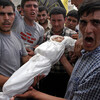
Twenty-two Palestinians were killed in the last 36 hours in the Gaza Strip (including a three-year-old girl). Wednesday (26 July) saw the highest daily death toll since 28 June - the start of what the Israel Defense Forces (IDF) have code-named ‘Operation Summer Rains’. Since the last Situation Report (18 July), there have been a significant number of Palestinian casualties - 50 dead and more than 230 injured - from IDF incursions, shellings and Israel Air Force (IAF) air strikes. Of the 150 Palestinians that have been killed since 28 June, approximately one-quarter of have been reported as children (31). At least 541 Palestinians have been injured. Read more about OCHA: 22 Palestinians killed in Gaza in past 36 hours
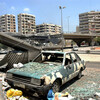
The number of casualties and displaced persons continues to increase. Official figures report 346 dead and over 1,234 injured, the great majority civilians. Thirty-seven Israelis have been killed, about half of them civilians. The Israeli military hit the Rashidiyeh Palestine Refugee camp in Tyre today for the first time in its offensive, wounding 6 people. The total number of affected people includes some 150,000 Lebanese, 1,000 Palestinians and 20,000 Third Country Nationals who have reached Syria. In addition, 115,000 Third Country Nationals (TCNs) from some 20 countries remain in Lebanon. Read more about OCHA: Civilian death toll mounts in Lebanon

One week after the start of the hostilities, the humanitarian situation in Lebanon is worsening with the civilian population particularly affected, notably in southern Lebanon, Beirut and the Beqaa Valley. Over 300 people have reportedly been killed (30% of which are children, according to UNICEF), and over 860 wounded. Current planning figures suggest that there may be 500,000 conflict-affected people (including IDPs and those unable to relocate). Read more about OCHA: Lebanon Response Update (1)
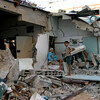
The Palestinian death toll now stands at 100 (including 16 children) since the Israel Defense Forces (IDF) launched military operations inside the Gaza Strip on 28 June. The number of Palestinians injured has climbed to 300. Two Israelis in Sderot were injured by Palestinian homemade rockets. Since 28 June, one IDF soldier has been killed and twelve Israelis have been injured. Since 28 June, Palestinians fired 177 homemade rockets towards Israel. The IDF fired over 1,000 artillery shells into Gaza, and the Israeli air force conducted 168 aerial bombings on Gaza. Read more about Gaza Strip Situation Report No. Seven
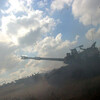
On July 14, United Nations (UN) Emergency Relief Coordinator, Jan Egeland, called on the donor community to assit the United Nations and its partners in their efforts to meet the most urgent needs of the Palestinian population and respond promptly and generously to the revised emergency Appeal for the occupied Palestinian territory (oPt) 2006. Norway, Spain and Sweden convened a meeting in Geneva to encourage the international donor community to increase it response to the deterioration humanitarian conditions in the Palestinian territory. Read more about UN publishes Revised Emergency Appeal to Meet Most Urgent Needs of Palestinians
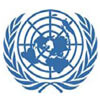
The humanitarian situation continues to deteriorate in the Gaza Strip due to shortages of electricity and water, caused by the 28 June bombing by the Israel Air Force (IAF) of the Gazan power plant, and the continued sporadic opening of only some of Gaza’s crossing points. Electricity supply to households and institutions remains severely depleted. Gazans are receiving on average 6 - 8 hours of electricity per day and for most families living in urban areas 2 - 3 hours of water per day. Almost half the population in the Gaza Strip are children, who are living in an environment of violence, fear and insecurity. Read more about Gaza Strip Situation Report No. 6

In the last 24 hours (since 10pm on 5 July), at least 15 Palestinians have been killed and 66 injured in the Gaza Strip. The majority of these Palestinians have been killed and injured in confrontations with the IDF in Palestinian towns and villages, including Khan Younis in the south and Beit Lahia in the north. In Beit Lahia, one Israel Defence Forces (IDF) soldier was killed and another injured and airlifted on Thursday. During the last 24 hours, the IDF expanded their military incursion into the Gaza Strip. The IDF moved additional troops and armour into the former northern settlement block. Read more about Gaza Strip Situation Report No. 5

Between 15 and 20 Israel Defense Forces (IDF) tanks and Armored Personnel Carriers (APC) moved into the Gaza Strip from the northern border at noon today and positioned themselves in the former Nisanit settlement area. Palestinian security forces were advised to leave their positions in the area and the IDF closed Erez crossing at 11am today. The Gaza Electrical Distribution Company (GEDCO) continues to load-share the available electric supply across the Gaza Strip though power is intermittent and often not synchronised with water supply to households. Families face difficulties to secure water for personal hygiene. Read more about Gaza Strip Situation Report, 5pm
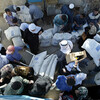
At just before 1pm today a suspect vehicle reportedly carrying explosives was apprehended by Palestinian security forces in close proximity to Karni terminal. Karni has now been closed and staff ordered to leave the crossing as investigations take place. As of 26 April, Karni crossing has been closed 55 days in 2006 (47% of the year). The crossing has been subject to periodic closure by the Israeli authorities since January 2006 on the grounds of security concerns. The extent of the recent closures is unprecedented when compared to a closure of 18% of the year in 2005 and 19% in 2004. Read more about Gaza Strip Situation Report
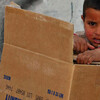
The current humanitarian emergency followed the outbreak of violence in September 2000 and is a result of restrictions on Palestinian freedom of movement, military operations, land confiscation and levelling and the construction of the Barrier. A serious intensification of this situation is now possible following the victory of the Hamas party in the Palestinian Legislative Council elections held in January 2006. has stopped handing over to the PA VAT and customs taxes that it collects on Palestinian goods on its behalf. Recently however, the GoI has announced that it would use a proportion of this money to pay for electricity, water and fuel costs owed to Israeli companies. At the same time, Western donors signalled their intention to review their funding support to the PA. Read more about UN warns of humanitarian crisis in Palestine









